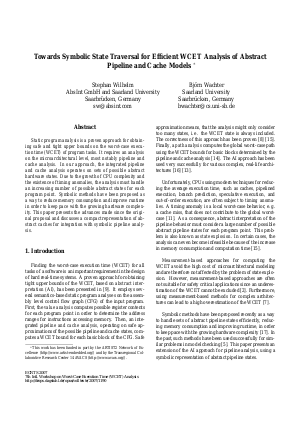Towards Symbolic State Traversal for Efficient WCET Analysis of Abstract Pipeline and Cache Models
Authors Stephan Wilhelm, Björn Wachter
-
Part of:
Volume:
7th International Workshop on Worst-Case Execution Time Analysis (WCET'07) (WCET 2007)
Part of: Series: Open Access Series in Informatics (OASIcs)
Part of: Conference: Workshop on Worst-Case Execution Time Analysis (WCET) - License:
 Creative Commons Attribution-NonCommercial-NoDerivs 3.0 Unported license
Creative Commons Attribution-NonCommercial-NoDerivs 3.0 Unported license
- Publication Date: 2007-11-13
File

PDF
OASIcs.WCET.2007.1190.pdf
- Filesize: 143 kB
- 6 pages
Document Identifiers
Subject Classification
Keywords
- WCET
- worst-case execution time
- hard real-time
- embedded systems
- abstract interpretation
- pipeline analysis
- cache analysis
- symbolic state traversal BDD
Metrics
- Access Statistics
-
Total Accesses (updated on a weekly basis)
0Document
0Metadata
Abstract
Static program analysis is a proven approach for obtaining safe and tight upper bounds on the worst-case execution time (WCET) of program tasks. It requires an analysis on the microarchitectural level, most notably pipeline and cache analysis. In our approach, the integrated pipeline and cache analysis operates on sets of possible abstract hardware states. Due to the growth of CPU complexity and the existence of timing anomalies, the analysis must handle an increasing number of possible abstract states for each program point. Symbolic methods have been proposed as a way to reduce memory consumption and improve runtime in order to keep pace with the growing hardware complexity. This paper presents the advances made since the original proposal and discusses a compact representation of abstract caches for integration with symbolic pipeline analysis.
Cite As Get BibTex
Stephan Wilhelm and Björn Wachter. Towards Symbolic State Traversal for Efficient WCET Analysis of Abstract Pipeline and Cache Models. In 7th International Workshop on Worst-Case Execution Time Analysis (WCET'07). Open Access Series in Informatics (OASIcs), Volume 6, pp. 1-6, Schloss Dagstuhl – Leibniz-Zentrum für Informatik (2007)
https://doi.org/10.4230/OASIcs.WCET.2007.1190
BibTex
@InProceedings{wilhelm_et_al:OASIcs.WCET.2007.1190,
author = {Wilhelm, Stephan and Wachter, Bj\"{o}rn},
title = {{Towards Symbolic State Traversal for Efficient WCET Analysis of Abstract Pipeline and Cache Models}},
booktitle = {7th International Workshop on Worst-Case Execution Time Analysis (WCET'07)},
pages = {1--6},
series = {Open Access Series in Informatics (OASIcs)},
ISBN = {978-3-939897-05-7},
ISSN = {2190-6807},
year = {2007},
volume = {6},
editor = {Rochange, Christine},
publisher = {Schloss Dagstuhl -- Leibniz-Zentrum f{\"u}r Informatik},
address = {Dagstuhl, Germany},
URL = {https://drops.dagstuhl.de/entities/document/10.4230/OASIcs.WCET.2007.1190},
URN = {urn:nbn:de:0030-drops-11904},
doi = {10.4230/OASIcs.WCET.2007.1190},
annote = {Keywords: WCET, worst-case execution time, hard real-time, embedded systems, abstract interpretation, pipeline analysis, cache analysis, symbolic state traversal BDD}
}
